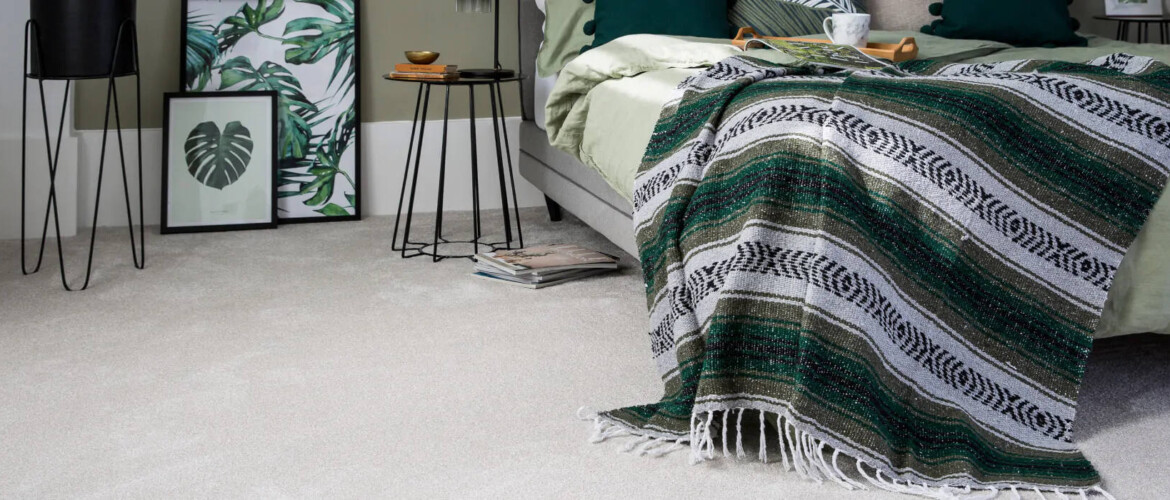
When it comes to choosing a new carpet for your home or business premises, getting a wool carpet may be the traditional choice. We all know wool as a natural material that feels soft underfoot, with a beautiful aesthetic and excellent long-term durability. But with so many synthetic alternatives available, is wool the best choice of carpet for your home? It’s always a good idea to look at the pros and cons before purchasing.
At Greg Stone Flooring, your independent carpet and flooring specialist in Sussex, we have a vast range of top-quality carpets for you to choose from – and at very keen prices too. Visit our Brighton warehouse showroom for a huge selection of carpets for all lifestyles and budgets, and ask about our special deals on room-size roll-ends and remnants that are in stock to take away immediately.
What are the advantages of fitted wool carpets?
There’s no denying that wool carpets are a long-term investment in your home. Enjoy the return on your investment every day with added comfort underfoot and a luxury feel, whether you’re opting for 100% natural wool fibres or a wool mix (typically 80% wool, 20% manmade fibres) carpet.
- Durability and strength
Wool fibres are naturally robust and elastic and perform exceptionally well under pressure. With their superior ‘bounce back’, pile compression, tracking marks and shading are all significantly reduced. It’s why wool carpets manage to look good for much longer – years, if not decades.
- Dirt and stain resistance
Wool fibres are opaque and contain natural oils, which not only makes dirt harder to see but also harder to stick. Being naturally stain and dirt-repellent, wool carpets look clean for much longer. Regular vacuum cleaning is typical for all that’s required.
- Warmth and comfort
Wool acts as an insulator, keeping your toes toasty but your house warm too. A fitted wool carpet is an energy-efficient investment to provide added warmth. Wool is also a great sound absorber, cushioning your home against excess noise and creating a comfortable environment.
- Flame and fire resistance
Wool carpets are one of the safest flooring materials for homes and businesses, being naturally fire-resistant and extremely slow to ignite. In the event of a fire, carpet fibres will melt rather than burn, which can slow or prevent a fire from spreading.
- Protection from fall accidents
When it comes to home safety, the natural coil and softness of a wool carpet act as a cushion, and even more so if a quality underlay is used. Whether it’s young children or elderly residents, any falls will have a soft landing and protect against serious injury.
- Hypoallergenic properties
Wool is a naturally ‘smart’ fibre – it can absorb humidity in the air and release it back when the air becomes dry, creating a balanced, healthy atmosphere. What’s more, wool fibres will hold onto dust particles until vacuumed, which is good for allergies and asthma sufferers.
- Sustainable, biodegradable material
Carpet made from sheep’s wool (typically British or New Zealand sheep) is 100% natural, fully sustainable and soil biodegradable. As we focus on more responsible practices to protect our planet from climate change, wool carpets are an excellent choice to support the environment.
Get in touch for a quote or visit our warehouse
What are the disadvantages of wool carpets?
Looking at the ‘pros’, wool carpets are an attractive flooring proposition for your home or business. But whether you are looking for domestic carpets or contract carpets, the advantages must be weighed up against the disadvantages, so let us now consider some of the ‘cons’.
- Initial expenditure
Investing in wool carpets is not a cheap option. Their price reflects the production costs of a luxury product, and cleaning and maintenance costs over the lifecycle of the carpet should also be factored in. That said, their long-term durability may well be worth the high initial outlay.
- Absorbency problems
Wool fibres are highly absorbent, which can be an issue if carpets are fitted in high-moisture areas such as bathrooms or if there are major spills or prolonged water exposure. If carpet fibres become saturated, mildew can form over time, resulting in discolouration and unpleasant odours.
- Risk of staining
While wool is naturally resistant to oil-based stains, it is prone to be stained by non-oil-based liquids such as coffee or wine. These stains may be hard, if not impossible, to remove, requiring extra care and professional attention.
- Chemical damage
Strong caustic chemicals (>9.5pH) coming into contact with wool fibres can cause them to harden, lose colour or dissolve unless fully cleaned and neutralised. Your professional carpet cleaner should be able to recommend a pH-neutral, safe carpet cleaning product.
- Light sensitivity
Wool carpets are sensitive to sunlight, meaning that continual exposure to bright sunlight over a prolonged period can cause colours to fade, which may well spoil the carpet’s appearance over time.
Are wool carpets a good purchase?
There’s no question that wool is the most classic carpet fibre available. While the initial cost can be higher and a wool carpet may require more care and attention than synthetic alternatives, it is a luxury option with many advantages that may make the investment worthwhile in the longer term.
However, if budget is an issue or you are worried about children or pets spoiling your luxury wool carpet, or you are planning to move home in the next few months or years, investing in a wool carpet may not be the best use of funds.
Visit Greg Stone Flooring in Portslade and take a look at the wealth of carpet options on offer. We have a large selection of carpet samples available for quick delivery and installation anywhere in Sussex, and many room-size carpet end-of-rolls in stock for immediate supply. Our friendly, knowledgeable team is on hand for professional advice and guidance on the best choice of flooring for your requirement.

